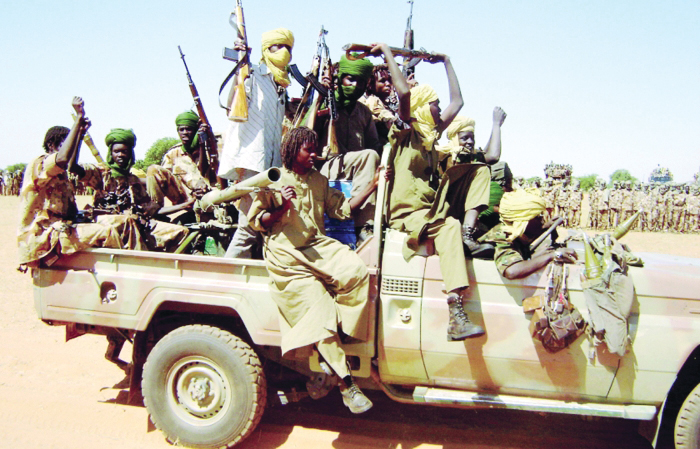Mercenaries in Sudan’s War… Horrific Violations and Price Taking

Sudan Events – Aya Ibrahim
At the beginning of this year, Sudan National Television reviewed, based on statistics from Chadian media platforms, based in turn on statistics from international institutions about the participation of foreign mercenaries who were paid by the Rapid Support Forces (RSF) Militia to fight in its ranks in its war and rebellion against the Sudanese Armed Forces since April last year, which led to the involvement of a number of countries in the Sudanese crisis, where thousands of people were killed in the current war.
Accusation against a militia
According to statistics, the countries of Chad, Niger, Central Africa, South Sudan, Somalia, Nigeria, Congo, Yemen, Libya, and the UAE involved their mercenaries in the Sudan war, where a number of mercenaries belonging to these countries were killed, while others are missing.
Sudanese army commanders often accuse the RSF Militia of seeking the help of militants from foreign countries, such as Niger, Chad, and others. This is a talk that was frequently reported by the army commander, Lieutenant General Abdul Fattah Al-Burhan, and his assistant, Lieutenant General Yasser Al-Atta, as Chadians are the most important expatriate elements for military work. For reasons including tribal overlap, the closeness of common customs and culture with western Sudan, the ease of movement and infiltration into Sudan, and the presence of social incubators.
Moral defeat
Dr. Al-Rashid Muhammad Ibrahim, Professor of Political Science and International Relations believes that the issue of mercenaries in the war remained inherent to the RSF Militia even before the outbreak of the war, and there was speculation about the ineligibility of some mercenary members and that they did not have the national number. Also, the recruitment operations that were taking place outside the supervision of the Training and Operations Authority may have led to the shortcomings and that the RSF continued to suffer from an identity problem due to its subordination once to the intelligence and another time to the Presidency of the Republic.
Mohammad Ibrahim told (Sudan Events) that the issue of mercenaries increased after the war, which could not have extended and taken this long if the militia had not taken some consultations from external parties, led by the UAE and Wagner, about entering citizens’ homes. He noted that the first strike directed by the army eliminated Most of the hard power of the militia, so they had no options in continuing the war other than resorting to mercenaries who are not concerned with the fighting, its bases, and even the strategic areas that could constitute a priority for the militia’s operations, and they focus on the spoils areas. Therefore, it is difficult to control and hold them accountable. Instead of the mercenaries having a beneficial effect on the rebel operations, they have become a burden on them, even in terms of behavior, violations, and crimes committed, and they have become a harsh burden on the militia. He pointed out that the mercenaries need to be evaluated a year after the rebellion, indicating that they are an opponent of the militia because they did not achieve victories after the army’s expansions and extensions. He said that the crimes committed before mercenaries represent an opponent and a moral defeat in their own right.
Mercenary leaders
During the first days of the RSF Militia’s rebellion against the Sudanese Armed Forces, the army published on its media platforms a video showing what it said was the leader of the Chadian “Oppressed Movement”, Hussein Al-Amin Jojo, fighting in the ranks of the RSF Militia in Khartoum. After that, the field commander appeared, who is called “Jalha” in the militia’s ranks, and media reports indicated that he was among the forces fighting in Libya.
Militia adventure
The leader of the Justice and Equality Movement, Hassan Ibrahim, begins his speech by saying: There is no doubt that the adventure undertaken by the RSF Militia is based on the well-known Janjaweed policy that it implemented in Darfur since the year 2003-2004, a policy based on burning and plundering the property of citizens and defenseless civilians. Therefore, this war was a matter of attraction and polarization. For all the mercenary criminals in neighboring African countries and also from countries that have tribal ties to the militia, which led to thousands entering the Sudan war.
Ibrahim pointed out to (Sudan Events) that the atrocities that occurred against women, children, and civilian homes are a natural result of the actions of the mercenaries who came from far and wide. He said that the biggest problem is not only the destruction that occurred at the hands of the militia mercenaries, but also that these mercenaries will constitute a security and economic burden in the country. The future of the Sudanese state, especially since a number of them came as a result of the temptations offered to them by the militia that Sudan would be the promised land and an alternative homeland for them, and that they would be its heirs after the annihilation of what they call the State of 56 and the remnants.
Recruitment monitoring
In Sudan’s complaint against the UAE to the UN Security Council about its participation in the war in the country and its support for the militia, documents revealed that a group was monitored recruiting fighters from Chad for the RSF Militia in August of last year. At the head of this group is Hamdan Jibril, nicknamed (Jokeki), a former colonel in the Chadian Gendarmerie, which collects young men from the mining areas of northern Chad in the Kouri region, and is assisted in this by “Khalil Asoula,” a camel trader who exports them to Libya, Hassan Sawt Al-Mahamid, who brings young men from the Arada and Baltine regions, and Hassan Rengo, who attracts young men from the 80 mine inside Libya, and the recruits are transferred. In small groups through the Adri station in Abbeshi, they are received in El Geneina by the so-called Mohammad Saeed Abu Al-Saud, who lives in El Geneina. The movement of 28 recruits from the Kalayet areas and lands on behalf of the rebel forces was also monitored during September of last year, that is, a month after the first monitoring operation. The group was dispatched from the Wadi Fira deportations to an Adre station in the city of Abeche to its owner, Hassan Amlis. The group entered the border through the Tulayha area and from there to El Geneina, where they were organized and pushed to Khartoum to participate in the operations, among the leaders of the group, “Al-Mahri Mohammad Barbouj.” This was followed by the movement of 89 individuals, according to Monitoring They were recruited for the RSF Militia, where the group moved from the Adri position in the city of Abeche, to enter Sudan through the village of Al-Taliha and from there to Al-Geneina, where the group is received by Mohammad Saeed Abu Al-Saud, one of the elements of the rebellion in Al-Geneina, and after arranging their situation, he sends them either to Khartoum or Nyala. .
Historical phenomenon
Military expert Omar Arbab points out that the phenomenon of mercenary earnings in wars is historical in internal or external wars, and he said it was known by the term “Kasaba”(Looters) or “Ghanama.(Spoils collectors)”
In his interview with (Sudan Events) , Arbab pointed out that the phenomenon continues and appeared more clearly in the April 15 war, by adopting the same methodology in seeking help.
Mercenaries in exchange for being satisfied with the spoils and what they can plunder from citizens or state institutions, as it is not possible to provide them with fixed salaries or after-service benefits. He said that addressing the phenomenon can only be done within a comprehensive framework by building a national army and regular forces that refrain from handing over weapons to any other forces in order to achieving military and political gains.
Mercenary sources
Earlier press reports revealed that the RSF Militia had concluded an agreement to recruit and train militias and mercenary groups, which included military aviation training in cooperation with Haftar, who sought to possess an effective air force in the region to work with him inside Libya, and to bring in former mercenary pilots from several African and European countries.
They said that the RSF Militia sought to train its members in Russia, Ethiopia, and Libya under full Emirati supervision, and that the UAE Military Attaché and the Wagner Company were carrying out all the required procedures in Sudan in the period from 2019, and that the militia’s aviation trainees joined camps in southern Russia owned and managed by the Wagner Group, Others were trained in Ethiopia.
They indicated that Abu Dhabi aimed to train militias and mercenaries to equip between 20 to 40 thousand fighters in stages extending over four years. Under the name RSF, these groups would have striking ground forces of more than 200 thousand fighters, in addition to armored forces, air forces, and special forces.
Militia’s confession
The RSF militia admits to using mercenaries to support it in its rebellion against the Sudanese Armed Forces, by publishing video clips on social media platforms of fighters in Chad and Niger declaring their support for it. This is supported by what was stated by the former head of the UNTAMS mission in Sudan, Volker Peretz, that the number of mercenaries who came from Mali Chad and Niger have significant support from the RSF, and what eyewitnesses in Khartoum reported of hearing fighters from the RSF Militia speaking French indicates that they are foreigners.
Earning factors
On the other hand, the security and strategic expert, Major General Amin Ismail, attributed the presence of groups of mercenaries in the ranks of the RSF to two workers, the first of whom is Madi Bah. He said that there is an alert in the countries neighboring Sudan and that the war in Sudan is for money, and therefore money can be given in dollars and naturalization and assignments are carried out through it, as Ismail indicated to (Sudan Events).
The second is represented by a need by RSF for mercenaries in two directions. The following covers the shortage of manpower after the solid mass of RSF was destroyed in the first months of the war in Khartoum State. The second need is in some rare specializations that require skill such as snipers, artillery, launchers, march management, intelligence information and control room management, explaining that the need for mercenaries has increased significantly, especially since local alert has not completed the shortage, whether in manpower or rare specialties that require skill.



